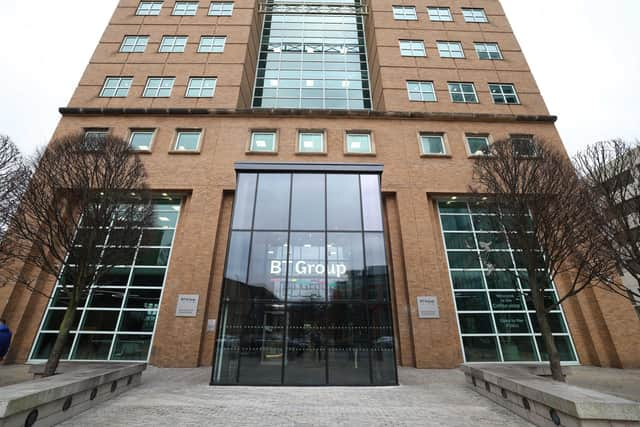BT Northern Ireland workforce braced as group announces job cuts of up to 55,000 people
and live on Freeview channel 276
As recently as March, a report commissioned by the BT Group revealed that the UK’s largest telecommunications company employs more than 3,200 people in Northern Ireland.
The company has a total workforce of 130,000 – a figure which includes staff and contractors, and it is from this number that between 40,000 and 55,000 jobs will be shed BT announced yesterday.
Advertisement
Hide AdAdvertisement
Hide AdThe telecommunications giant has given no indication in which regions cuts will be made but broadly the company has said that more than 15,000 jobs will go when BT completes building fibre networks in the UK, more than 10,000 cuts will be made because new UK networks require less maintenance, more than 10,000 workers will be replaced using new technology including AI and 5,000 jobs can be cut via restructuring.


The News Letter understands the majority of BT employees in Northern Ireland are engineers while there are also a number of staff who work in call centres in Portadown, Enniskillen, Londonderry and the company’s recently opened, multi-million pound refurbished Riverside Tower building in Belfast city centre.
The Communication and Workers Union (CWU) in Northern Ireland has around 2,400 members, mostly employed by BT but also a good number of the company’s sub contractors.
Erin Massey, CWU NI regional secretary, said that advances in technology should be bringing about more opportunities for employees rather than “fear going into the future”.
Advertisement
Hide AdAdvertisement
Hide AdShe said: “The CWU wish to protect all our members both within BT group and those who are subcontractors first and foremost.”
She said that there should be no direct redundancies and that the CWU will be working with the company to ensure this is the case.
Erin added: “The new technology should be giving all our members both in BT Group and other contractors more skills and opportunities to benefit from, and not fear going into the future.
“The super-fast speeds brought about by the building of a full fibre network, labour saving technology and new business opportunities should be reducing the pressure on our members allowing them to continue from working from home and to increased safe working practices.”
Advertisement
Hide AdAdvertisement
Hide AdBT chief executive Philip Jansen said: "By continuing to build and connect like fury, digitise the way we work and simplify our structure, by the end of the 2020s BT Group will rely on a much smaller workforce and a significantly reduced cost base.
"The new BT Group will be a leaner business with a brighter future."
BT, which is the UK's largest broadband and mobile provider, is currently continuing to expand its fibre network as it moves away from copper. The company said that once the work was completed it would not need as many staff to build and maintain its networks.
In Northern Ireland there are still many areas where copper networks need to be replaced.